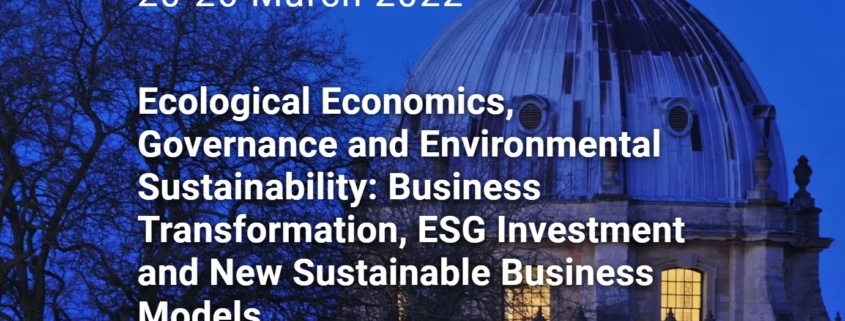Ecological Economics, Governance and Environmental Sustainability: Business Transformation, ESG Investment and New Sustainable Business Models
The School will address key elements of the new economy transformation, exploring the cutting edge methods, models and policy and business applications in ecological economics. With a clear sustainable development focus, it will draw on the expertise of a range of disciplines: economics, ecology, physics, environmental sciences, sociology, psychology, complex systems theory, etc. to address the current challenges: climate change, biodiversity loss, resource depletion, water shortages, social cohesion and achieving sustainability. The course will be composed of a theoretical and applied modules and will address multiple elements of the new economy transformation: a systemic vision of sustainability, multiple criteria methods supporting decision making and new tools for measuring progress. Particular emphasis this year will be on the role of business: sustainability transformation, ESG investment and new sustainable business models.
THEORY & APPLICATIONS
In the first part of the course, we will analyse the concept of economy-environment interactions, industrial ecology and circular economy which highlight the importance of intersectoral flows of matter and energy required for the production of the goods and services. The method of environmentally extended input-output analysis, actively used for policy applications around the world, will be introduced to illustrate this approach. Ideas of interdisciplinary synthesis and methodological pluralism will be introduced alongside institutional economic approaches. Next, it will explore the system of tools for decision making based on multicriteria methods, used for sustainability assessment and policy appraisal, which, applied at different levels, could shift the patterns of decisions making towards more socially equitable and more environmentally friendly as well as economically sound decisions. Acting as a bridge to the business module, the final theoretical session will criticise existing approaches to measure macro and business sustainability performance and will introduce new conceptual tools for the assessment of progress. A particular attention will be paid to ecosystems, the impacts of the economy on the ecosystems and alternative ecosystem services assessment and valuation techniques. The applied part of the course this year will be on business transformation, ESG investment and new sustainable business models.
AUDIENCE
The course is designed for multiple points of entry and could be helpful for Business CEOs, CFOs, CSOs, PhD and MBA students, government experts, and representatives of international organisations. The course will give participants an opportunity to explore key methodologies for ecological-economic analysis and to apply these to various case studies
EXPERTS
The applied module will be taught by active professionals and experts, who advise leading corporations, international organisations, national and city governments around the world and have experience working with EU institutions. The School will draw on the EU experience of environmental policy and will focus in its applied part on green fiscal reform, climate change, renewable energy, multidimensional poverty measurement, sustainable cities and values. The scope of sustainability issues addressed during the School, covering not only economic and environmental, but also social sustainability, will make this School truly unique.
OXFORD EXPERIENCE
The course will take place at a historic and atmospheric Balliol College, one of the oldest in Oxford, acting as a seat of learning since at least 1263. The unique environment will stimulate our dialogue and create wonderful memories for the years to come. The participants will forge lasting friendships and become part of an alumni network of professionals from 60 different countries.
“Seven years ago I was part of this wonderful experience. If you think it’s time to boost your career then consider this course.”
Vincent Awotwe-Pratt
NETWORK
The Oxford, Spring, Summer and Winter Schools in Ecological Economics organised by Environment Europe attracted participants from 60 countries, including Canada, USA, Mexico, Ecuador, Costa Rica, Brazil, Colombia, Peru, Argentina, Iceland, UK, France, Germany, Austria, Spain, Italy, Portugal, Belgium, the Netherlands, Czech Republic, Slovakia, Denmark, Norway, Sweden, Finland, Bosnia, Serbia, Croatia, Albania, Latvia, Morocco, Ghana, Nigeria, China, India, Sri Lanka, Taiwan, Philippines, Papua New Guinea, Australia and New Zealand, including UNDP, UNEP, IUCN, OECD, WWF, GGGI experts as well as representatives of ministries, companies like Deloitte and Shell, NGOs and leading universities. You will be able to see the happy faces of our alumni, professors and the names of organisations that sent their staff to be trained with us at Environment Europe in Oxford on our website.
We are looking forward to welcoming you to Oxford!



